Measurement Counter
CM30:CELL_SD_CALL_DROPS
Description
In the immediate assignment procedure and the handover procedure, after the MS accesses the SDCCH assigned by the BSC, the procedure fails to be performed due to various reasons. This measurement provides the number of call drops on the SDCCH. Alternatively, when the MS normally seizes the SDCCH, this measurement provides the number of call drops due to various reasons. Then the BSC sends the CLEAR REQUEST message to the MSC.
This measurement provides the number of call releases by the BSC on the SDCCH due to various reasons.
Unit
Integer number or integer.
Measurement Point
- 1. The BSC receives an ERROR INDICATION message from the BTS because of the abnormal connection on the radio link layer. For details, refer to GSM Rec. 08.58.
- 2. The BSC receives a CONNECTION FAILURE INDICATION message from the BTS because of link fault or hardware fault on the radio link layer. For details, refer to GSM Rec. 08.58.
- 3. When receiving a DISC frame on a link layer connection in multi-frame mode, the BTS sends a REL IND message to the BSC. For details, refer to GSM Rec. 08.58.
- 4. The timer set to wait for an HO CMP message expires during internal intra-cell handover.
- 5. The timer set to wait for an HO CMP message expires during outgoing internal inter-cell handover.
- 6. The timer set to wait for an HO CMP message expires during outgoing external inter-cell handover.
- 7. The timer set to wait for an HO CMP message expires during incoming external inter-cell handover.
- 8. The BSC does not receive any measurement report within a certain period (by default, five minutes) and sends a CLEAR COMMAND message to the MSC to release the call.
- 9. The BSC detects a broken RSL and releases all the calls on the RSL.
- 10. A call drop occurs in any of the following situations: TRX mutual aid; dynamic modification of cell attributes, TRX frequencies, or TRX FH data; dynamic deletion of cells or TRXs; blocking of cells, TRXs, or channels.
- 11. The timer set to wait for the outgoing BSC handover command expires, or the clear request message is received from the MSC before the timer expires.
- 12. A call drop occurs because of call assignment failure during the handover.
- 13. The MSC cannot send a short message because the data configuration prohibits the downlink short messages or because of flow control, and the call is released.
- 14. A call drop occurs because of software error.
- 15. After seizing a channel, the MS fails to start a local switching due to terrestrial resource request failure, failures on the BTS side, or timer expiration.
- 16. During the handover of the call in the local switching state, the BSC releases the call after receiving a HANDOVER DETECT message from the BTS and then a HANDOVER FAILURE message from the MS.
- 17. When a call is in the BSC or BTS local switching state, if the local switching cannot be proceeded for handover or other reasons, the BSC restores the call to the common call state. If the restoration fails for terrestrial resource request failure or other reasons, the BSC releases the call.
This counter is calculated at A1, A2, A3, A4, and A6, as shown in Figure 1, Figure 2, Figure 3, Figure 4, and Figure 5.
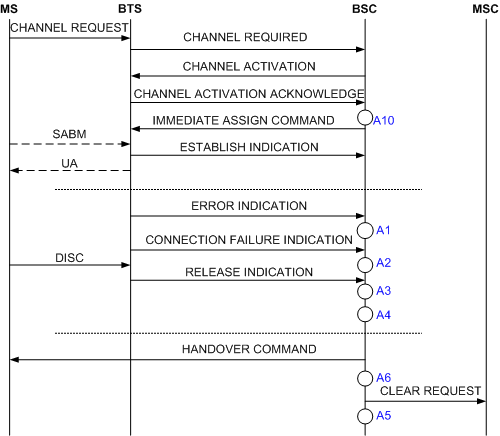
A1: Call Drops Due to ERR IND Received in Stable State, Call Drops Due to the ERR IND Received on the TRX in the Underlaid Subcell in Stable State, Call Drops Due to the ERR IND Received on the TRX in the Overlaid Subcell in Stable State |
A2: Call Drops Due to the CONN FAIL IND Received in Stable State, Call Drops Due to the CONN FAIL IND Received on the TRX in the Underlaid Subcell in Stable State, Call Drops Due to the CONN FAIL IND Received on the TRX in the Overlaid Subcell in Stable State |
A3: Call Drops Due to REL IND Received in Stable State, Call Drops Due to the REL IND Received on the TRX in the Underlaid Subcell in Stable State, Call Drops Due to the REL IND Received on the TRX in the Overlaid Subcell in Stable State |
A4: Call Drops Due to No MRs from MS for a Long Time, Call Drops Due to No MR from the MS on the TRX in the Underlaid Subcell, Call Drops Due to No MR from the MS on the TRX in the Overlaid Subcell, Call Drops due to Abis Terrestrial Link Failure, Call Drops Due to Abis Terrestrial Link Failure on the TRX in the Underlaid Subcell, Call Drops Due to Abis Terrestrial Link Failure on the TRX in the Overlaid Subcell, Call Drops Due to Equipment Failure, Call Drops Due to TRX Failure in the Underlaid Subcell, Call Drops Due to TRX Failure in the Overlaid Subcell, Call Drops due to Resource Check, Call Drops Due to Resource Check on the TRX in the Underlaid Subcell, Call Drops Due to Resource Check on the TRX in the Overlaid Subcell |
A5: Clear Requests Sent on the A Interface |
A6: Call Drops Due to Forced Handover, Call Drops Due to Forced Handover on the TRX in the Underlaid Subcell, Call Drops Due to Forced Handover on the TRX in the Overlaid Subcell |
A10: Successful SDCCH Seizures (Call Type) |
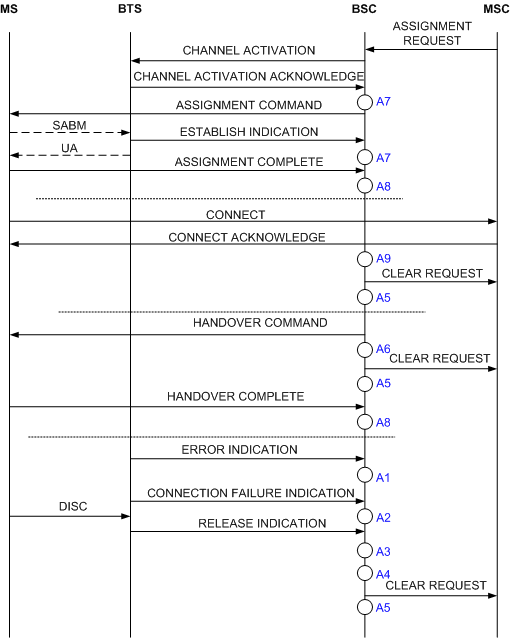
A1: Call Drops Due to ERR IND Received in Stable State, Call Drops Due to the ERR IND Received on the TRX in the Underlaid Subcell in Stable State, Call Drops Due to the ERR IND Received on the TRX in the Overlaid Subcell in Stable State |
A2: Call Drops Due to the CONN FAIL IND Received in Stable State, Call Drops Due to the CONN FAIL IND Received on the TRX in the Underlaid Subcell in Stable State, Call Drops Due to the CONN FAIL IND Received on the TRX in the Overlaid Subcell in Stable State |
A3: Call Drops Due to REL IND Received in Stable State, Call Drops Due to the REL IND Received on the TRX in the Underlaid Subcell in Stable State, Call Drops Due to the REL IND Received on the TRX in the Overlaid Subcell in Stable State |
A4: Call Drops Due to No MRs from MS for a Long Time, Call Drops Due to No MR from the MS on the TRX in the Underlaid Subcell, Call Drops Due to No MR from the MS on the TRX in the Overlaid Subcell, Call Drops due to Abis Terrestrial Link Failure, Call Drops Due to Abis Terrestrial Link Failure on the TRX in the Underlaid Subcell, Call Drops Due to Abis Terrestrial Link Failure on the TRX in the Overlaid Subcell, Call Drops Due to Abis Link Failures in Stable Loopback State, Call Drops Due to Equipment Failure, Call Drops Due to TRX Failure in the Underlaid Subcell, Call Drops Due to TRX Failure in the Overlaid Subcell, Call Drops Due to Resource Check, Call Drops Due to Resource Check on the TRX in the Underlaid Subcell, Call Drops Due to Resource Check on the TRX in the Overlaid Subcell, Call Drops Due to Handover Failure During the Loopback, Call Drops Due to Other Causes in Stable State |
A5: Clear Requests Sent on the A Interface, Call Drops after Answer, Call Drops After Answer on the TRX in the Underlaid Subcell, Call Drops After Answer on the TRX in the Overlaid Subcell |
A6: Call Drops Due to Forced Handover, Call Drops Due to Forced Handover on the TRX in the Underlaid Subcell, Call Drops Due to Forced Handover on the TRX in the Overlaid Subcell, Failed Internal Intra-Cell Handovers (Timer Expired) |
A7: Call Drops Due to Loopback Start Failure |
A8: Successful TCH Seizures on the TRX in the Underlaid Subcell, Successful TCH Seizures on the TRX in the Overlaid Subcell, Call Drops Due to Failures to Return to Normal Call from Loopback |
A9: Successful Connections |
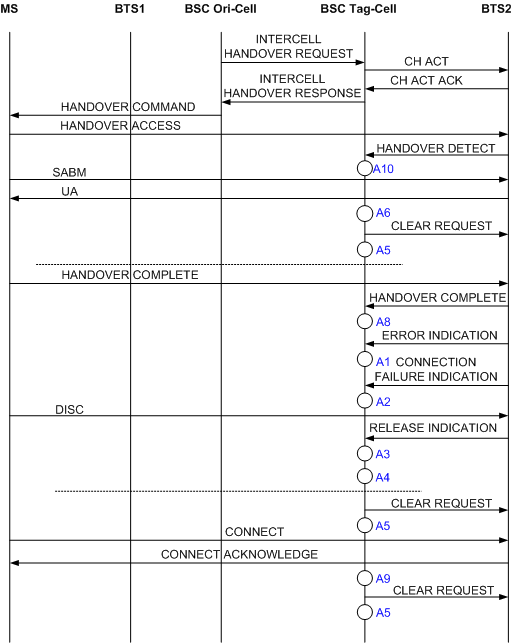
A1: Call Drops Due to ERR IND Received in Stable State, Call Drops Due to the ERR IND Received on the TRX in the Underlaid Subcell in Stable State, Call Drops Due to the ERR IND Received on the TRX in the Overlaid Subcell in Stable State |
A2: Call Drops Due to the CONN FAIL IND Received in Stable State, Call Drops Due to the CONN FAIL IND Received on the TRX in the Underlaid Subcell in Stable State, Call Drops Due to the CONN FAIL IND Received on the TRX in the Overlaid Subcell in Stable State |
A3: Call Drops Due to REL IND Received in Stable State, Call Drops Due to the REL IND Received on the TRX in the Underlaid Subcell in Stable State, Call Drops Due to the REL IND Received on the TRX in the Overlaid Subcell in Stable State |
A4: Call Drops Due to No MRs from MS for a Long Time, Call Drops Due to No MR from the MS on the TRX in the Underlaid Subcell, Call Drops Due to No MR from the MS on the TRX in the Overlaid Subcell, Call Drops due to Abis Terrestrial Link Failure, Call Drops Due to Abis Terrestrial Link Failure on the TRX in the Underlaid Subcell, Call Drops Due to Abis Terrestrial Link Failure on the TRX in the Overlaid Subcell, Call Drops Due to Abis Link Failures in Stable Loopback State, Call Drops Due to Equipment Failure, Call Drops Due to TRX Failure in the Underlaid Subcell, Call Drops Due to TRX Failure in the Overlaid Subcell, Call Drops Due to Resource Check, Call Drops Due to Resource Check on the TRX in the Underlaid Subcell, Call Drops Due to Resource Check on the TRX in the Overlaid Subcell, Call Drops Due to Other Causes in Stable State |
A5: Clear Requests Sent on the A Interface, Call Drops after Answer, Call Drops After Answer on the TRX in the Underlaid Subcell, Call Drops After Answer on the TRX in the Overlaid Subcell |
A6: Call Drops Due to Forced Handover, Call Drops Due to Forced Handover on the TRX in the Underlaid Subcell, Call Drops Due to Forced Handover on the TRX in the Overlaid Subcell, Failed Internal Intra-Cell Handovers (Timer Expired), Failed Outgoing Internal Inter-Cell Handovers (Timer Expired), Call Drops Due to Handover Failure During the Loopback |
A7: Call Drops due to Failures to Return to Normal Call from Loopback |
A8: Successful TCH Seizures on the TRX in the Underlaid Subcell, Successful TCH Seizures on the TRX in the OverLaid Subcell |
A9: Successful Connections |
A10: Successful SDCCH Seizures (Call Type) |
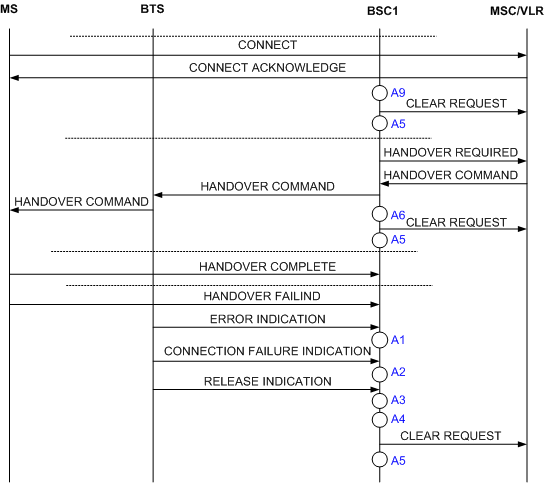
A1: Call Drops Due to ERR IND Received in Stable State, Call Drops Due to the ERR IND Received on the TRX in the Underlaid Subcell in Stable State, Call Drops Due to the ERR IND Received on the TRX in the Overlaid Subcell in Stable State |
A2: Call Drops Due to the CONN FAIL IND Received in Stable State, Call Drops Due to the CONN FAIL IND Received on the TRX in the Underlaid Subcell in Stable State, Call Drops Due to the CONN FAIL IND Received on the TRX in the Overlaid Subcell in Stable State |
A3: Call Drops Due to REL IND Received in Stable State, Call Drops Due to the REL IND Received on the TRX in the Underlaid Subcell in Stable State, Call Drops Due to the REL IND Received on the TRX in the Overlaid Subcell in Stable State |
A4: Call Drops Due to No MRs from MS for a Long Time, Call Drops Due to No MR from the MS on the TRX in the Underlaid Subcell, Call Drops Due to No MR from the MS on the TRX in the Overlaid Subcell, Call Drops due to Abis Terrestrial Link Failure, Call Drops Due to Abis Terrestrial Link Failure on the TRX in the Underlaid Subcell, Call Drops Due to Abis Terrestrial Link Failure on the TRX in the Overlaid Subcell, Call Drops Due to Abis Link Failures in Stable Loopback State, Call Drops Due to Equipment Failure, Call Drops Due to TRX Failure in the Underlaid Subcell, Call Drops Due to TRX Failure in the Overlaid Subcell, Call Drops Due to Resource Check, Call Drops Due to Resource Check on the TRX in the Underlaid Subcell, Call Drops Due to Resource Check on the TRX in the Overlaid Subcell, Call Drops Due to Other Causes in Stable State |
A5: Clear Requests Sent on the A Interface |
A6: Call Drops Due to Forced Handover, Call Drops Due to Forced Handover on the TRX in the Underlaid Subcell, Call Drops Due to Forced Handover on the TRX in the Overlaid Subcell, Failed Outgoing External Inter-Cell Handovers (T8 Expired), Call Drops Due to Handover Failure During the Loopback |
A9: Successful Connections |
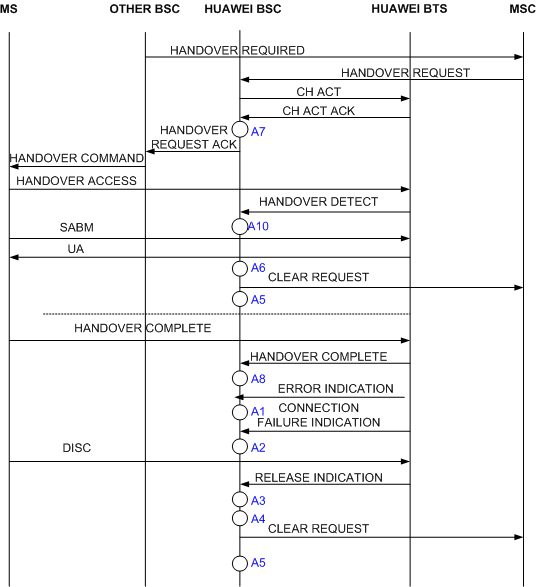
A1: Call Drops Due to ERR IND Received in Stable State, Call Drops Due to the ERR IND Received on the TRX in the Underlaid Subcell in Stable State, Call Drops Due to the ERR IND Received on the TRX in the Overlaid Subcell in Stable State |
A2: Call Drops Due to the CONN FAIL IND Received in Stable State, Call Drops Due to the CONN FAIL IND Received on the TRX in the Underlaid Subcell in Stable State, Call Drops Due to the CONN FAIL IND Received on the TRX in the Overlaid Subcell in Stable State |
A3: Call Drops Due to REL IND Received in Stable State, Call Drops Due to the REL IND Received on the TRX in the Underlaid Subcell in Stable State, Call Drops Due to the REL IND Received on the TRX in the Overlaid Subcell in Stable State |
A4: Call Drops Due to No MRs from MS for a Long Time, Call Drops Due to No MR from the MS on the TRX in the Underlaid Subcell, Call Drops Due to No MR from the MS on the TRX in the Overlaid Subcell, Call Drops due to Abis Terrestrial Link Failure, Call Drops Due to Abis Terrestrial Link Failure on the TRX in the Underlaid Subcell, Call Drops Due to Abis Terrestrial Link Failure on the TRX in the Overlaid Subcell, Call Drops Due to Abis Link Failures in Stable Loopback State, Call Drops Due to Equipment Failure, Call Drops Due to TRX Failure in the Underlaid Subcell, Call Drops Due to TRX Failure in the Overlaid Subcell, Call Drops Due to Resource Check, Call Drops Due to Resource Check on the TRX in the Underlaid Subcell, Call Drops Due to Resource Check on the TRX in the Overlaid Subcell, Call Drops Due to Other Causes in Stable State |
A5: Clear Requests Sent on the A Interface |
A6: Call Drops Due to Forced Handover, Call Drops Due to Forced Handover on the TRX in the Underlaid Subcell, Call Drops Due to Forced Handover on the TRX in the Overlaid Subcell, Failed Incoming External Inter-Cell Handovers (Timer Expired), Call Drops Due to Handover Failure During the Loopback |
A7: Call Drops due to Failures to Return to Normal Call from Loopback |
A8: Successful TCH Seizures on the TRX in the Underlaid Subcell, Successful TCH Seizures on the TRX in the OverLaid Subcell |
A9: Successful Connections |
A10: Successful SDCCH Seizures (Call Type) |